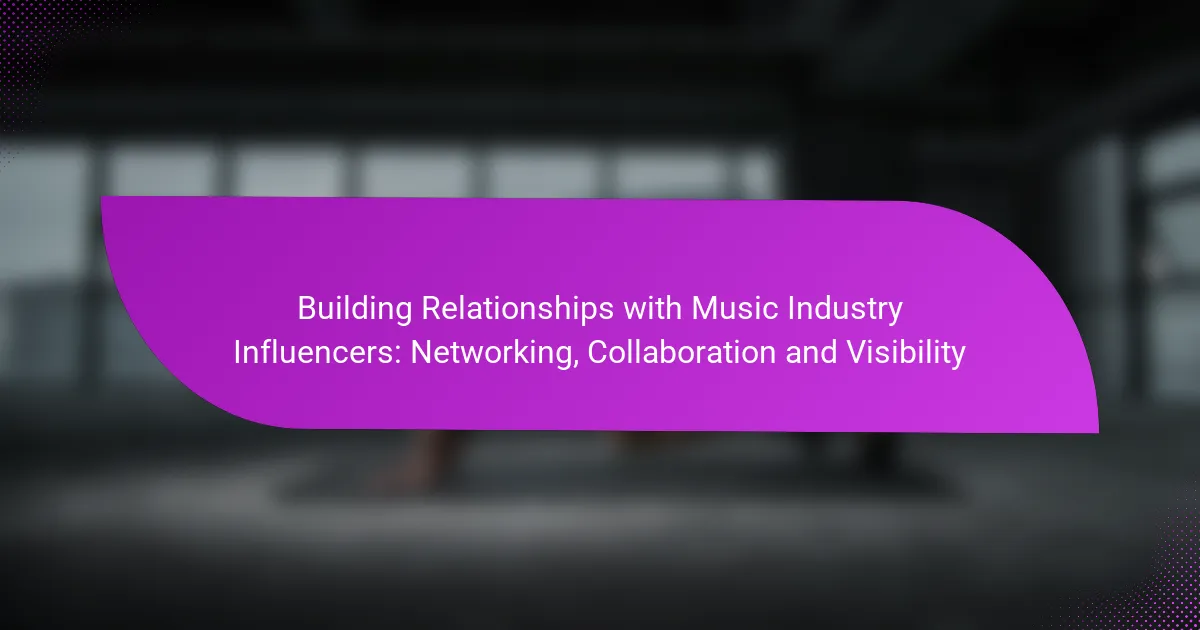Building relationships with music industry influencers is essential for enhancing your visibility and opportunities within the scene. By focusing on genuine networking and strategic collaborations, artists can create impactful partnerships that resonate with wider audiences and elevate their careers.
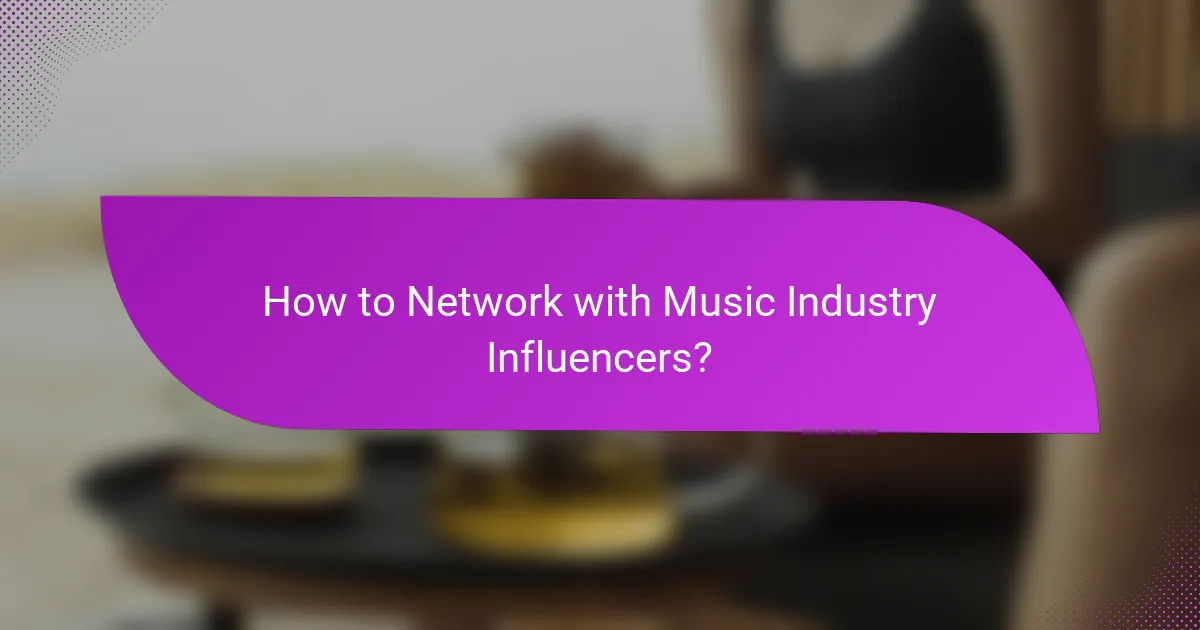
How to Network with Music Industry Influencers?
Networking with music industry influencers involves building genuine relationships through strategic interactions and collaborations. Focus on creating meaningful connections that can enhance your visibility and opportunities in the music scene.
Attend music industry events
Attending music industry events such as conferences, festivals, and showcases is a vital way to meet influencers face-to-face. These gatherings provide opportunities to engage in conversations, exchange ideas, and establish rapport with key players in the industry.
When attending, prepare by researching the attendees and creating a list of individuals you want to connect with. Bring business cards and be ready to discuss your work succinctly. Follow up with new contacts after the event to reinforce your connection.
Utilize social media platforms
Social media platforms like Instagram, Twitter, and LinkedIn are essential tools for networking with music industry influencers. Use these platforms to share your work, engage with their content, and participate in conversations relevant to your niche.
Be authentic in your interactions; comment thoughtfully on their posts and share insights that reflect your expertise. Consistency in your online presence can help you stand out and attract attention from influencers who resonate with your style.
Join music-focused online communities
Joining music-focused online communities, such as forums and Facebook groups, allows you to connect with like-minded individuals and industry professionals. These platforms often facilitate discussions, collaborations, and sharing of resources that can enhance your networking efforts.
Participate actively by contributing valuable content and insights, and don’t hesitate to reach out to members for advice or collaboration opportunities. Building relationships in these communities can lead to introductions to influential figures in the music industry.
Leverage mutual connections
Leveraging mutual connections can be an effective way to network with music industry influencers. If you share contacts with someone influential, consider asking for an introduction or a referral.
When approaching mutual connections, be clear about your intentions and how you can provide value to both parties. This approach not only increases your chances of a positive response but also establishes trust through shared acquaintances.
Participate in collaborative projects
Engaging in collaborative projects with other artists or industry professionals can significantly enhance your visibility and credibility. Look for opportunities to co-write songs, produce tracks, or participate in joint performances.
These collaborations often lead to exposure to each other’s networks, allowing you to connect with influencers you may not have reached otherwise. Ensure that you communicate openly and set clear expectations to foster a successful partnership.
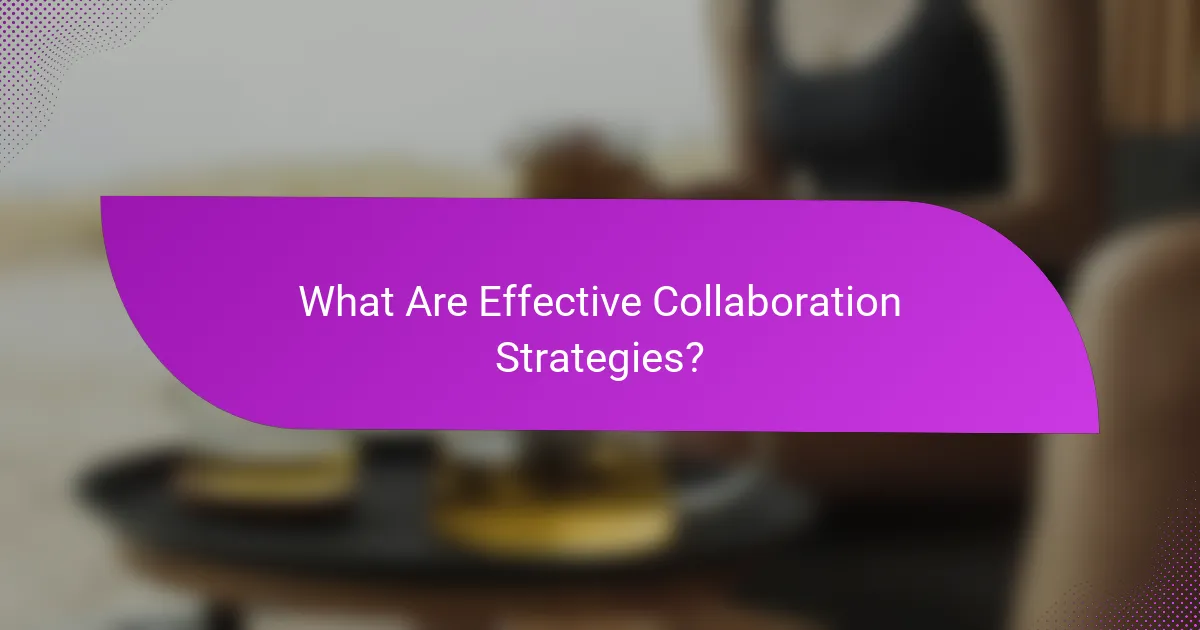
What Are Effective Collaboration Strategies?
Effective collaboration strategies in the music industry involve creating mutually beneficial partnerships that enhance visibility and reach. By leveraging each other’s strengths, artists and influencers can create impactful projects that resonate with wider audiences.
Co-create content with influencers
Co-creating content with influencers allows artists to tap into established audiences while providing fresh material. This can include joint music videos, live performances, or social media challenges that showcase both parties’ talents. Aim for projects that align with both brands to ensure authenticity and engagement.
Consider platforms like Instagram or TikTok for short-form content, where collaboration can quickly gain traction. Regularly assess the performance of these collaborations to refine future efforts and maximize impact.
Engage in joint marketing campaigns
Joint marketing campaigns can amplify the reach of both artists and influencers. This might involve shared promotional efforts such as cross-posting on social media, co-hosting events, or creating bundled merchandise. Establish clear goals and metrics to evaluate the success of these campaigns.
Utilize tools like email newsletters or targeted ads to reach specific demographics. Collaborating on marketing strategies can also help in sharing costs, making it a cost-effective approach for both parties.
Offer value through skill-sharing
Skill-sharing can enhance collaboration by allowing artists and influencers to learn from each other. This could involve workshops, tutorials, or mentorship programs where each party shares their expertise. For instance, a musician might teach songwriting techniques while an influencer offers insights on social media engagement.
Establish a clear framework for skill-sharing to ensure both parties benefit. Regular check-ins can help maintain momentum and adjust the focus based on evolving needs and interests.
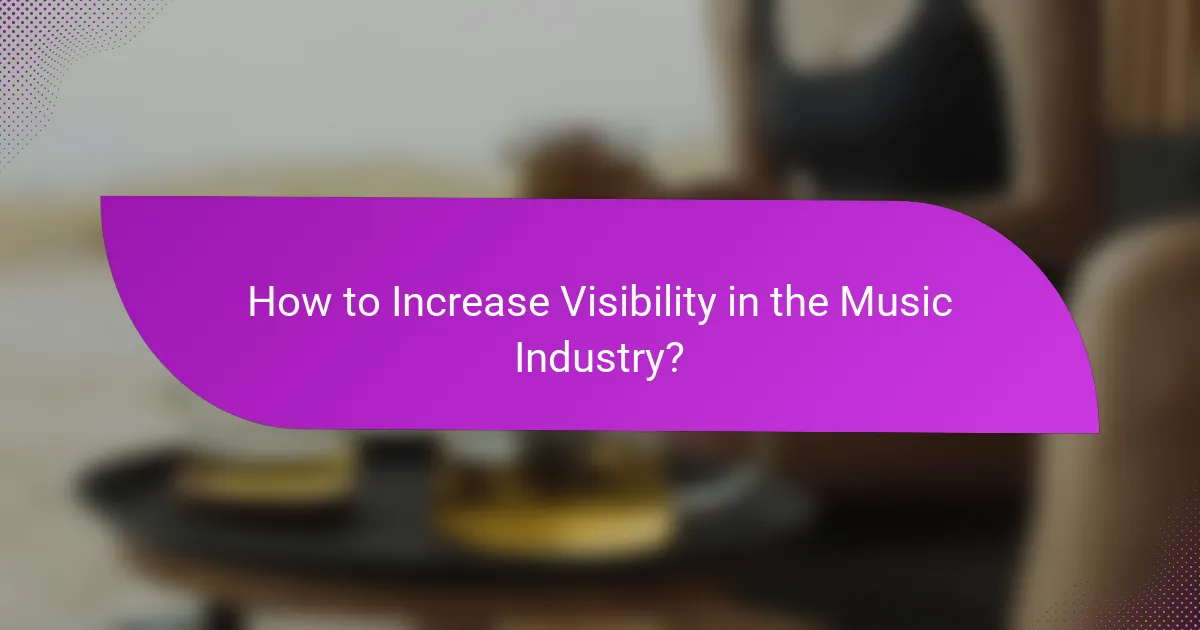
How to Increase Visibility in the Music Industry?
To increase visibility in the music industry, artists must strategically showcase their work and engage with their audience across various platforms. This involves optimizing online profiles, utilizing distribution services, and actively participating in music-related media.
Optimize social media profiles
Optimizing social media profiles is crucial for enhancing visibility in the music industry. Ensure your profiles are complete with professional images, a compelling bio, and links to your music. Use relevant keywords and hashtags to improve discoverability.
Regularly update your content to keep followers engaged. Share behind-the-scenes footage, upcoming events, and personal stories to create a connection with your audience. Aim for consistency in branding across platforms like Instagram, Facebook, and Twitter.
Utilize music distribution platforms
Music distribution platforms are essential for reaching a wider audience. Services like DistroKid, TuneCore, and CD Baby allow artists to distribute their music to major streaming services such as Spotify, Apple Music, and Amazon Music. Choose a platform that fits your budget and offers favorable royalty rates.
Consider the distribution timeline; it often takes a few days to weeks for music to appear on streaming services. Plan releases strategically to maximize exposure, such as aligning with promotional campaigns or events.
Engage with music blogs and podcasts
Engaging with music blogs and podcasts can significantly boost your visibility. Research blogs and podcasts that align with your genre and reach out with a personalized pitch. Offer exclusive content, such as interviews or early access to new tracks, to entice them to feature you.
Participating in interviews or guest appearances can help you tap into established audiences. Be proactive in following up and maintaining relationships with bloggers and podcasters to foster ongoing collaboration opportunities.
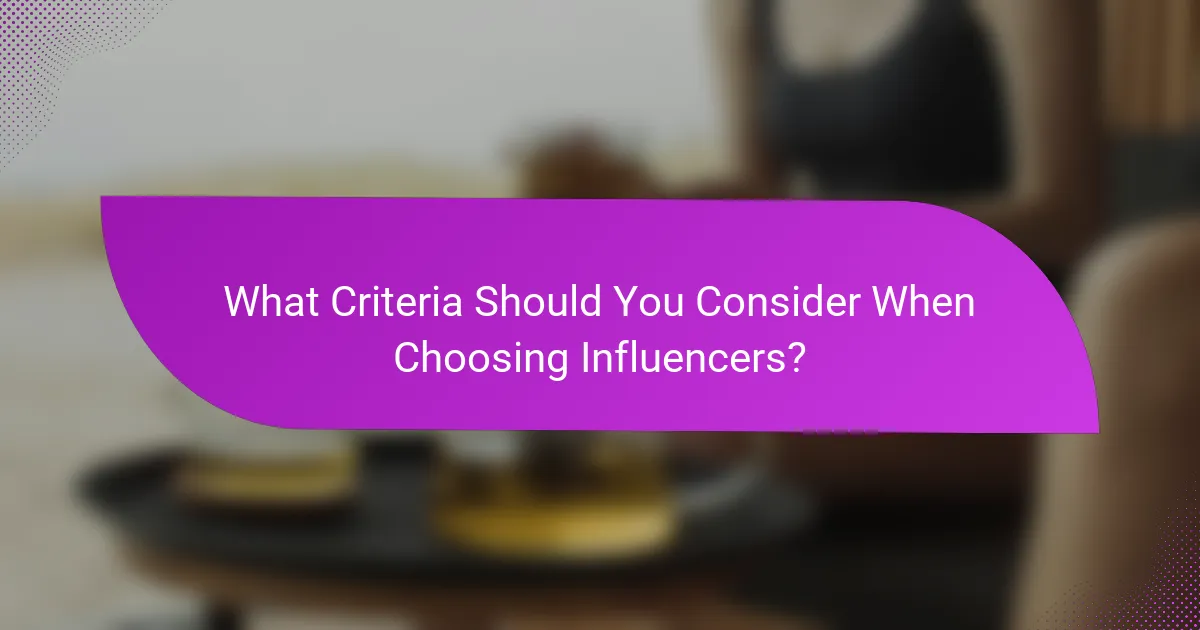
What Criteria Should You Consider When Choosing Influencers?
When selecting influencers in the music industry, consider their relevance to your genre, engagement rates, audience size, and their previous collaborations and reputation. These factors will help ensure that your partnerships are effective and beneficial for your visibility and networking efforts.
Relevance to your genre
Choosing influencers who align with your music genre is crucial for authentic collaboration. An influencer who specializes in pop music may not resonate with an audience that prefers indie rock. Look for influencers who have a history of promoting artists within your specific genre to maximize impact.
Research their content to see if they regularly feature similar styles or themes. This alignment can create a more genuine connection with their audience, increasing the likelihood of successful engagement with your music.
Engagement rates and audience size
Engagement rates are often more telling than sheer audience size. An influencer with a smaller but highly engaged following can be more effective than one with millions of followers who rarely interact. Aim for influencers with engagement rates above 2-3% as a benchmark for effective outreach.
Analyze metrics such as likes, shares, and comments on their posts. Tools like social media analytics can help you gauge these figures, allowing you to make informed decisions about potential collaborations.
Previous collaborations and reputation
Investigate an influencer’s past collaborations to understand their reputation and reliability. Influencers with a track record of successful partnerships are likely to bring value to your project. Look for testimonials or case studies that highlight their effectiveness in promoting music.
Be cautious of influencers who have faced controversies or negative feedback. A strong, positive reputation can enhance your credibility, while a questionable one may harm your brand. Always conduct thorough research before making a commitment.
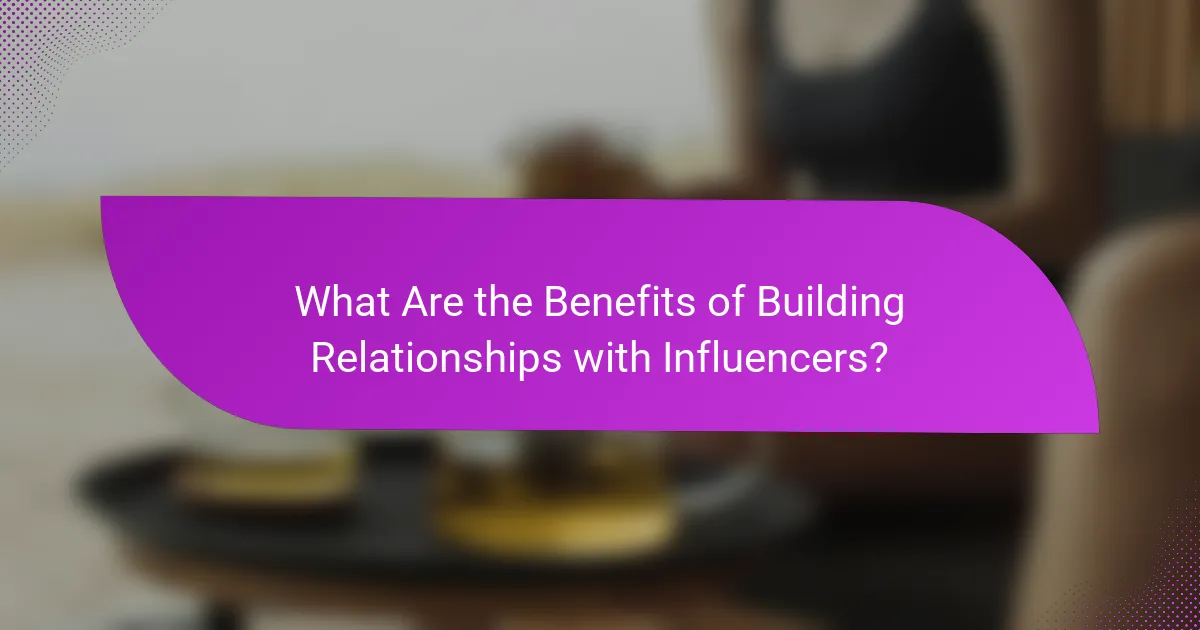
What Are the Benefits of Building Relationships with Influencers?
Building relationships with music industry influencers offers significant advantages, including increased visibility, access to new audiences, and enhanced credibility. These benefits can lead to greater opportunities for collaboration and career growth in the competitive music landscape.
Increased exposure and reach
Establishing connections with influencers can dramatically boost your exposure in the music industry. When influencers share your work or collaborate with you, their established audience becomes aware of your brand, leading to a wider reach.
Consider leveraging social media platforms where influencers are active. Engaging with their content and participating in discussions can increase your chances of being noticed. Aim for authentic interactions rather than just promotional messages.
Access to new audiences
Collaborating with influencers allows you to tap into their dedicated fan base, which may differ from your current audience. This access can introduce your music to listeners who are genuinely interested in your genre or style.
To maximize this benefit, identify influencers whose audience aligns with your target demographic. For instance, if you create indie music, partnering with an influencer known for promoting similar artists can yield fruitful results.
Enhanced credibility and trust
Working with respected influencers can significantly enhance your credibility in the music industry. Their endorsement can serve as a powerful validation of your talent and artistry, fostering trust among potential fans and industry professionals.
To build this credibility, focus on creating high-quality content and maintaining professionalism in all interactions. Avoid overreaching; instead, seek genuine partnerships that reflect your values and artistic vision. This approach will help you cultivate lasting relationships that benefit both parties.
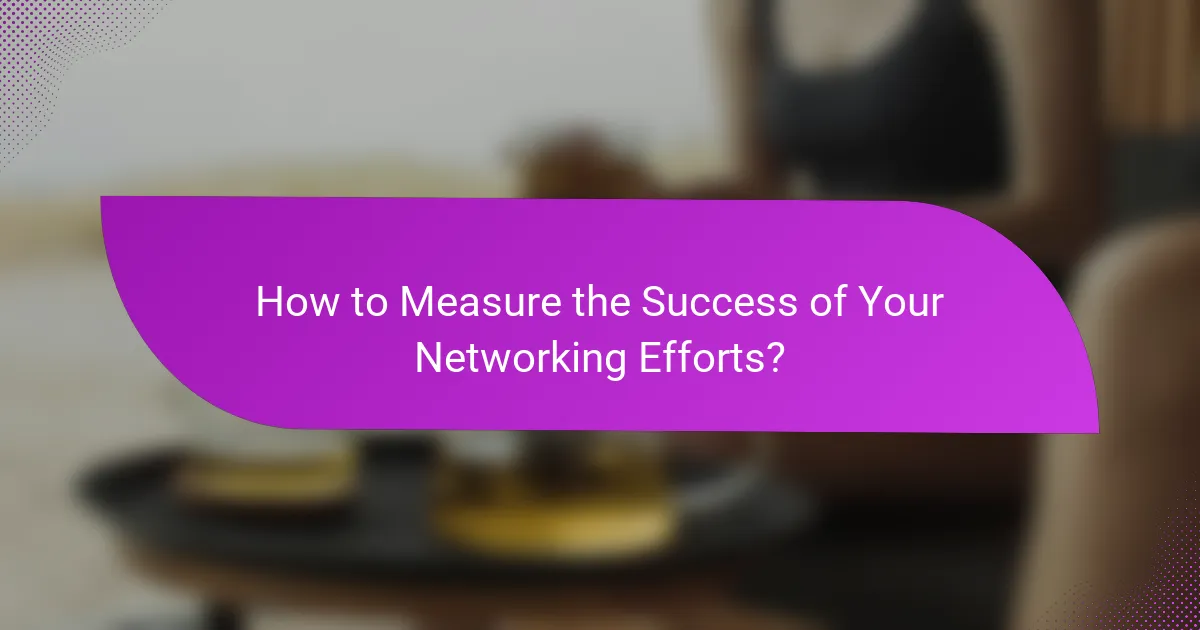
How to Measure the Success of Your Networking Efforts?
Measuring the success of your networking efforts in the music industry involves evaluating various engagement metrics and qualitative feedback. Key indicators include the number of meaningful connections made, collaborations initiated, and visibility gained through social media and industry events.
Track engagement metrics
Engagement metrics are essential for assessing how well your networking strategies are working. Focus on quantifiable data such as likes, shares, comments, and follower growth on social media platforms. These numbers can provide insights into how your content resonates with your audience and industry influencers.
Additionally, consider tracking the number of direct messages or inquiries you receive from industry contacts after networking events. A rise in these interactions can indicate that your networking efforts are yielding positive results. Tools like Google Analytics or social media insights can help you monitor these metrics effectively.
Establish a baseline for your metrics before you start networking, so you can compare progress over time. Aim for specific targets, such as increasing your social media engagement by 20% within six months, to keep your efforts focused and measurable.
